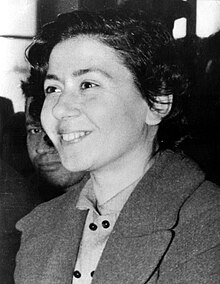
Nikos Kazantzakis was a Greek writer. Widely considered a giant of modern Greek literature, he was nominated for the Nobel Prize in Literature in nine different years.
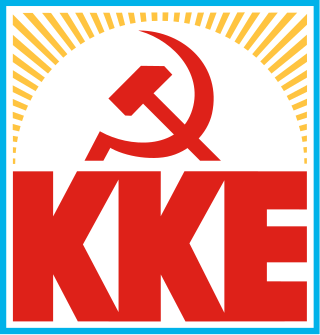
The Communist Party of Greece is a Marxist–Leninist political party in Greece. Founded in 1918 as the Socialist Labour Party of Greece and adopted its current name in November 1924. It is the oldest political party in modern Greek politics. The party was banned in 1936, but played a significant role in the Greek resistance and the Greek Civil War, and its membership peaked in the mid-1940s. Legalization of the KKE was restored following the fall of the Greek military junta of 1967–1974.
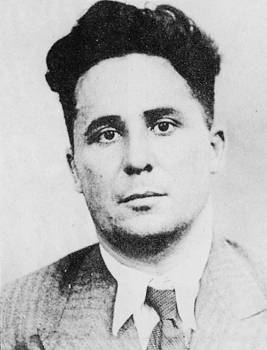
Nikos Zachariadis was the General Secretary of the Communist Party of Greece (KKE) from 1931 to 1956, and one of the most important personalities in the Greek Civil War.

Nikos Beloyannis was a Greek resistance leader and leading cadre of the Greek Communist Party.
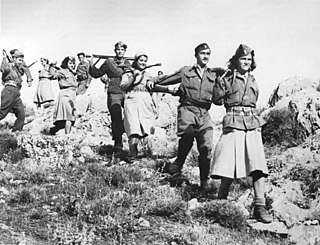
The Greek People's Liberation Army (Greek: Ελληνικός Λαϊκός Απελευθερωτικός Στρατός, Ellinikós Laïkós Apeleftherotikós Stratós was the military arm of the left-wing National Liberation Front during the period of the Greek resistance until February 1945, when, following the Dekemvriana clashes and the Varkiza Agreement, it was disarmed and disbanded. ELAS was the largest and most significant of the military organizations of the Greek resistance.

Yiannis Ritsos was a Greek poet and communist and an active member of the Greek Resistance during World War II. While he disliked being regarded as a political poet, he has been called "the great poet of the Greek left".
Evripidis Bakirtzis, born in Serres, Ottoman Empire, was a Hellenic Army officer and politician. Dismissed from the army twice due to his participation in pro-republican coup attempts and sentenced to death, later during the Axis Occupation of Greece, in World War II he co-founded the National and Social Liberation (EKKA) resistance group along with Dimitrios Psarros and was the military head of the organization. He later joined and was a prominent member of the National Liberation Front (EAM) and its military wing the Greek People's Liberation Army (ELAS). He served as head of the Political Committee of National Liberation (PEEA), a government of Greek Resistance-held territories also called the "Mountain Government", from 10 March to 18 April 1944. He was nicknamed "the Red Colonel", from his pen name in the newspaper of the Communist Party of Greece, the Rizospastis.

Athanasios Klaras, better known by the nom de guerreAris Velouchiotis, was a Greek journalist, politician, member of the Communist Party of Greece, the most prominent leader and chief instigator of the Greek People's Liberation Army (ELAS) and the military branch of the National Liberation Front (EAM), which was the major resistance organization in occupied Greece from 1942 to 1945.
Nicolas Calas was the pseudonym of Nikos Kalamaris, a Greek-American poet and art critic. While living in Greece, he also used the pseudonyms Nikitas Randos and M. Spieros.

Sophia N. Antonopoulou is a professor at the National Technical University of Athens, Greece and holds a PhD in economics from the University College London, UK. She has published four books as well as scientific and opinion articles in numerous publications in Greece and abroad.

The Greek Civil War took place from 1946 to 1949. The conflict, which erupted shortly after the end of World War II, consisted of a Communist-dominated uprising against the established government of the Kingdom of Greece. The opposition declared a people's republic, the Provisional Democratic Government of Greece, which was governed by the Communist Party of Greece (KKE) and its military branch, the Democratic Army of Greece (DSE). The rebels were supported by Yugoslavia and the Soviet Union. With the support of the United Kingdom and United States, the Greek government forces ultimately prevailed.
Konstantinos Th. Bakopoulos (1889–1950) was a Greek General in the Hellenic Army who took part in the Balkan Wars (1912–3), played a crucial conciliatory role in Greek military politics during the 1930s and distinguished himself in the fight against the Nazis during World War II. In 1943 he was imprisoned in German concentration camps until the end of the war in 1945.
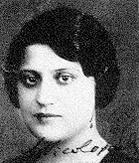
Dido Sotiriou was a Greek novelist, journalist, and playwright.

Alexandra Paschalidou-Moreti, Greek: Αλεξάνδρα Πασχαλίδου-Μωρέτη, was a Greek architect who designed pavilions for numerous international exhibitions.
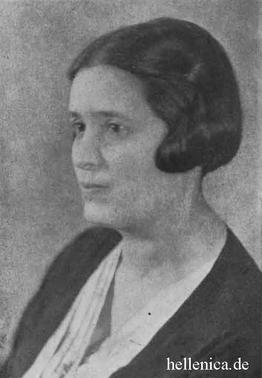
Semni Papaspyridi-Karouzou was a Greek classical archaeologist who specialized in the study of pottery from ancient Greece. She was the first woman to join the Greek Archaeological Service; she excavated in Crete, Euboea, Thessaly, and the Argolid, and worked as Curator of ceramic collections at the National Archaeological Museum in Athens for over thirty years. She experienced political persecution under the Greek military junta of 1967-1974. She has been described by the archaeologists Marianna Nikolaidou and Dimitra Kokkinidou as "perhaps the most important woman in Greek archaeology", and by the newspaper To Vima as "the last representative of the generation of great archaeologists".

Lili Zografou was a Greek journalist, novelist, dramatist, essayist, and political activist, best known for Nikos Kazantzakis: enas traghikos, her "destructive critique" of the work of Nikos Kazantzakis, published in 1959, three years after his death.

Elli Lambridi, also spelled Helle Lampride or Helle Lambridis, was a Greek philosopher who wrote extensively in the fields of ancient and modern philosophy. She also wrote on archaeology, wrote fiction and produced translations. She was also an educator and was active in Greek left-wing politics and feminism from an early age. It has been claimed that her prominence in twentieth-century Greek philosophy has "only recently become widely known". Her life and work was celebrated on 8 March 2017 at a talks event in the old Senate chamber of the Parliament of Greece in Athens.
White Terror is the term used in Greece, analogous to similar cases, for the period of persecution of members of the Communist Party of Greece (KKE) and other former members of the leftist World War II-era resistance organization National Liberation Front (EAM) in 1945–46, prior to the outbreak of the Greek Civil War.

The Massacre of the First Sapper Battalion was the mass murder of 350 Greek soldiers imprisoned in the Makronisos prison island perpetrated by the camp guards and prisoner functionaries belonging to the Third Sapper Battalion. The massacre took place between 29 February and 1 March 1948, during the Greek Civil War.
Rita Boumi-Pappa (1906–1984) was a Greek poet, translator and short story writer. She published a total of sixteen poetry books, one being in Italian.
